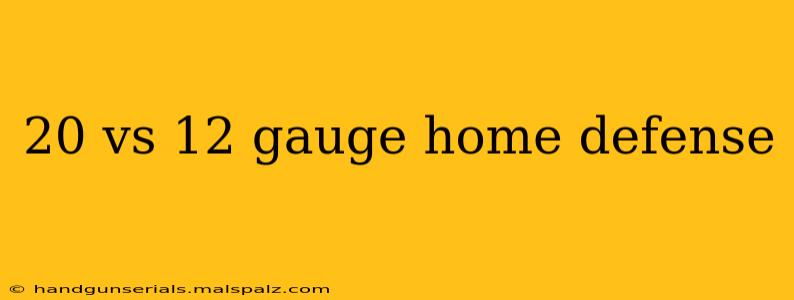Choosing the right firearm for home defense is a critical decision, demanding careful consideration of various factors. This article compares two popular gauges—20 gauge and 12 gauge—to help you make an informed choice based on your specific needs and capabilities. We'll delve into the pros and cons of each, addressing recoil, ammunition availability, and overall effectiveness in a home defense scenario.
Recoil: A Significant Factor
One of the most significant differences between 20 gauge and 12 gauge shotguns lies in recoil. 12 gauge shotguns are known for their substantial recoil, which can be challenging for smaller individuals or those new to firearms. This powerful recoil can impact accuracy, especially under stress, and may lead to flinching, reducing the effectiveness of follow-up shots.
The 20 gauge, on the other hand, offers significantly less recoil. This makes it a more manageable option for a wider range of users, allowing for quicker target acquisition and more controlled follow-up shots. For individuals who prioritize manageable recoil and faster shot-to-shot transitions, the 20 gauge emerges as a strong contender.
Recoil Management Techniques
Regardless of gauge, proper shooting techniques are crucial. These include:
- Proper stance: Maintaining a stable and balanced stance minimizes recoil's impact.
- Grip: A firm, but not overly tight, grip helps control the firearm.
- Shoulder mount: Ensuring proper shoulder positioning absorbs recoil effectively.
- Follow-through: Maintaining focus on the target even after firing improves accuracy.
Ammunition Availability and Cost
Both 20 gauge and 12 gauge ammunition are readily available, though 12 gauge boasts a significantly wider selection, including various shot types, slugs, and specialized rounds designed for home defense. This broader selection provides greater flexibility in choosing the optimal ammunition for your specific needs. However, the wider availability also typically translates to a wider range of prices, with some specialized 12-gauge ammunition being quite expensive.
20 gauge ammunition, while readily available, often has a smaller selection and might be slightly more expensive per round compared to 12 gauge, depending on the specific type and manufacturer.
Effectiveness in Home Defense Scenarios
In close-quarters home defense scenarios, both gauges can be highly effective. The spread of the shot pattern is crucial. Both 20 and 12 gauge shotguns deliver a devastating spread at close ranges, effectively incapacitating threats. However, the slightly less powerful 20 gauge might require a more precise shot placement to ensure a quicker incapacitation compared to the 12 gauge. The reduced recoil of the 20 gauge could, however, lead to more accurate shot placement for some users, offsetting the power difference.
Choosing the Right Gauge: A Personal Decision
Ultimately, the best gauge for home defense depends on the individual user's physical capabilities, experience level, and personal preferences. If manageable recoil is a priority, the 20 gauge presents a compelling option. However, the wider ammunition selection and greater stopping power of the 12 gauge might be preferred by those comfortable handling its recoil.
Consider these factors carefully:
- Your physical strength and experience: Can you comfortably handle the recoil of a 12 gauge?
- Your level of training: Regular practice is essential regardless of the chosen gauge.
- Your home's layout: Consider the distances you're likely to engage a threat at.
- Your comfort level: Choosing a firearm you're comfortable and confident using is paramount.
This information is for educational purposes only and should not be considered professional firearm advice. Always consult with a qualified firearms instructor and local laws before purchasing or using any firearm for home defense. Safe and responsible firearm handling is critical.

